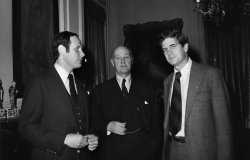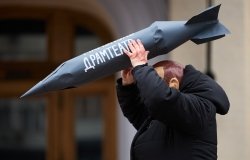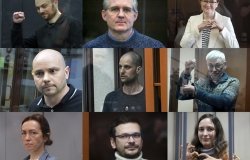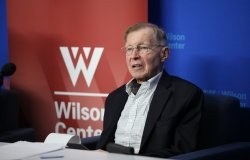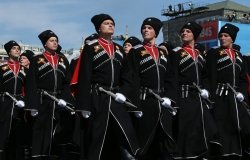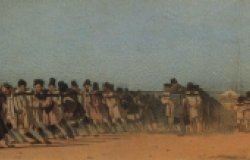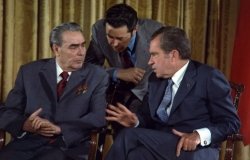Filling in the Blanks for the Prague Spring
Overview
By Joseph Dresen
Recreating the events surrounding the Warsaw Pact invasion of Czechoslovakia to crush the Prague Spring in 1968, "even with existing archives, is very difficult," declared Miklos Kun, Professor of History, Eötvös Loránd University (ELTE), Budapest at a Kennan Institute lecture on 23 February 1999. Two different commissions in Czechoslovakia, separated by twenty years, investigated the events of 1968. "Amazingly, testimony given by the very same politicians to the two commissions was very different. So to rely on only the archives makes it very difficult to establish the truth," Kun noted.
To fill in the "blank spots" of 1968, Kun used untapped sources in the Hungarian archives and a recently published collection of oral history interviews he conducted with key participants. Kun's collection of oral histories is especially valuable, stated Mark Kramer, Director, Harvard Project on Cold War Studies, and Senior Associate, Davis Center for Russian Studies, Harvard University. Kramer emphasized that Kun, with his grasp of the subject, was able to draw his interview subjects out and correct them as necessary.
Kun's research in the Hungarian archives revealed explanations of Hungary's actions during the period. Kun demonstrated that Hungarian leader Janos Kadar played a unique role in the crisis, one made possible by an extensive network of informants and agents of influence in Czechoslovakia. These individuals were not Hungarians, but Czech and Slovak politicians. One such informant was Oldrich Svestka, an anti-reform member of the Czech communist presidium and editor of a prominent newspaper. Svestka passed state and communist party secrets to the Hungarian embassy that were not shared with Soviet diplomats.
Thanks to his network of agents and informants, Kun contended, Kadar was even better informed than the Soviet leadership of the political balance in Prague.Kadar used this intelligence to his own advantage, keeping some information to himself and passing other items along to the Soviets. Kun claimed that the Kremlin first learned through Budapest of the exact attitude of Dubcek's ruling circle in 1968 regarding the intention of supporters of "socialism with a human face" to pursue the Yugoslav model and seek independence from Soviet influence.
Kun recorded in his book the oral histories of some of the key figures from the 1968 invasion. These individuals include the Soviet Ambassador to Prague, Stepan Chernovenko; the commander of the occupying forces, Soviet General Alexander Mayorov; and Czechoslovak Communist Party Central Committee member, Vaclav Slavik. Oral histories provide a deeper understanding not only of the events of the period, but also of the motivations of the main actors. For example, Kun stated that his interviews revealed how Dubcek's background influenced his actions in 1968. His training as a youth in Moscow gave him an advantage in working with Soviet apparatchiks to attain his own ends, but also instilled a deep distrust and resentment of Moscow's authority.
Kramer commented on other aspects of the decision to invade Czechoslovakia. He noted that agreements from the early 1960s to deploy Soviet nuclear weapons on the territory of Czechoslovakia were placed in jeopardy by the Prague Spring. These weapon sites would have given the Soviets their first military presence in Czechoslovakia since 1945, and were a key element in Soviet military planning against NATO. Kramer stated that the Soviet leaders were quite well informed about what was going on in the Czechoslovak leadership, and that there was a reasonable consensus in 1968 that the reforms had gone too far. Within that consensus there were differences as to how to proceed. Those who were relatively cautious, like the Soviet Politburo's chief ideologist, Mikhail Suslov, and Soviet General Secretary, Leonid Brezhnev, were aware that military intervention would have costs as well as benefits. More aggressive leaders such as the KGB's chief, Yuri Andropov, and First Secretary of the Ukrainian Communist Party and Soviet Politburo member, Piotr Shelest, were worried that if the reforms were allowed to continue, they would lead to unrest not only in other satellite states of Eastern Europe, but even within Ukraine in the Soviet Union itself.
Both Kun and Kramer agreed that the United States was not in a position to prevent the invasion of Czechoslovakia. From the Soviet point of view, Czechoslovakia was too important to be allowed to escape from Soviet control. Kun quoted a Soviet general who said that the Soviet Union was going into Czechoslovakia "even if it means the outbreak of a third world war." In contrast, Kramer noted that the Johnson administration had placed an emphasis on bilateral relations and was distracted by the war in Vietnam. In the end, detente was to continue uninterrupted between the Soviet Union and the United States.
Hosted By

Kennan Institute
The Kennan Institute is the premier US center for advanced research on Eurasia and the oldest and largest regional program at the Woodrow Wilson International Center for Scholars. The Kennan Institute is committed to improving American understanding of Russia, Ukraine, Central Asia, the South Caucasus, and the surrounding region though research and exchange. Read more
Thank you for your interest in this event. Please send any feedback or questions to our Events staff.



